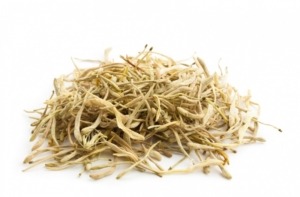General Details
Product name: Honeysuckle extract
Plant latin name: Lonicera japonica Thunb.
Product specifications: Chlorogenic acid 5-99.0% UV/HPLC
Appearance: Brown powder
Honeysuckle extract is extracted from the flower of plant honeysuckle (Lonicera japonica Thunb.); the main ingredient is chlorogenic acid, the color is a brown powder, and it can be used as raw materials for medicines, health products, and cosmetics.
The main active ingredients of honeysuckle are chlorogenic acid and Luteolin. Chlorogenic acid is widely used in medicine, the chemical industry, food, and other fields.
Health Benefits
Cardiovascular protection
As a free radical scavenger and antioxidant, chlorogenic acid has been proven to have a protective effect on the cardiovascular system by many experiments. Chlorogenic acid has a preventive, protective effect on oxidized low-density lipoprotein-induced human endothelial cell injury. Chlorogenic acid can protect cardiomyocytes from oxidative stress injury and significantly inhibit lipid peroxidation in microsomes and mitochondrial membranes in cardiomyocytes, with median inhibitory concentrations of 8.04±0.74 and 6.87±0.52, respectively. Chlorogenic acid can protect vascular endothelial cells by scavenging free radicals and resisting lipid peroxidation, thereby it plays a role in preventing and treating atherosclerosis, thromboembolic diseases, and hypertension.
Anti-mutagenic and anti-cancer effects
Chlorogenic acid has preventive and inhibitory effects on the occurrence of gastric cancer and colon cancer. The anti-mutagenic and anti-cancer mechanisms of chlorogenic acid may be related to the following factors:
Pro-oxidation: chlorogenic acid acts as a pro-oxidant in an alkaline environment, which can cause tumor cells to generate larger DNA fragments and cause nuclear agglutination. This enhances the activity of aromatic hydrocarbon hydroxylase: aromatic hydrocarbon hydroxylase is an important metabolic enzyme of polyaromatic hydrocarbons, and its increased activity will improve the mutagenic effect of tissue cells against polyaromatic hydrocarbon compounds.
In vitro studies have found that chlorogenic acid can enhance aromatic hydrocarbon hydroxylase activity. It inhibits the formation of 8-hydroxy-2 deoxyguanosine (8-OHDG): 8-OHDG is an important substance in carcinogenesis and cellular oxidative stress response, and it can induce point mutations in mammalian cells. Chlorogenic acid could inhibit the increase of 8-OHDG caused by 4-Nitroquinoline 1-Oxide (4NQO) but did not affect the level of endogenous 8-OHDG.
Lipid-lowering effect
Chlorogenic acid can significantly reduce the cholesterol and triglyceride content in plasma, and the level of triglyceride in the liver is also reduced considerably. Adding chlorogenic acid and caffeic acid to the food at the same time also found that the cholesterol content in the rat lung, liver, and other tissues decreased.
Immunity regulation
In vitro studies have shown that chlorogenic acid can significantly enhance the proliferation of T cells induced by influenza virus antigens and produce 7-IFN and a-IFN in human lymphocytes and human peripheral blood leukocytes. In a recent study, chlorogenic acid was also found to activate calcineurin to enhance macrophage function.
Other
Chlorogenic acid can also inhibit the production of cytokines and chemokines caused by staphylococcal exotoxin and the contraction of the collagen network of fibroblasts caused by hypertrophic scar-derived fibroblasts and the stress response. It increases adrenocorticotropic hormone (ACM). Chlorogenic acid also has anti-complement effects. In addition, chlorogenic acid can affect the concentration of trace elements in plasma. After intravenous injection of chlorogenic acid, the phosphorus content in plasma was significantly reduced, while the copper, magnesium, sodium, and potassium content was significantly increased.
In addition to chlorogenic acid, honeysuckle extract includes other active ingredients: Luteolin, isochlorogenic acid A, isochlorogenic acid B, and isochlorogenic acid C.
Luteolin
Luteolin can not only be anti-inflammatory and antioxidant but also reduce the damage caused by inflammatory factors and excessive reactive oxygen species to the body, protect normal tissues and cells; protect the nervous system, reduce the occurrence of neuropathy, improve memory, and improve cognitive function; It can achieve anti-tumor effect by inhibiting tumor cell proliferation and promoting apoptosis.
Isochlorogenic acid A
Isochlorogenic acid A and isochlorogenic acid C can inhibit leukocyte migration and the production of superoxide anion in the inflammatory process and have good anti-inflammatory effects in vitro.
Isochlorogenic acid B
Isochlorogenic acid B can promote the formation of prostaglandin E2, showing good anti-inflammatory activity.
Isochlorogenic acid C
Isochlorogenic acid A and isochlorogenic acid C can inhibit leukocyte migration and the production of superoxide anion in the inflammatory process and have good anti-inflammatory effects in vitro.
